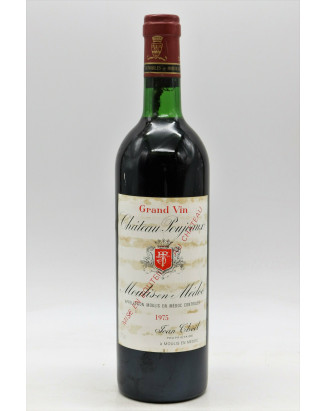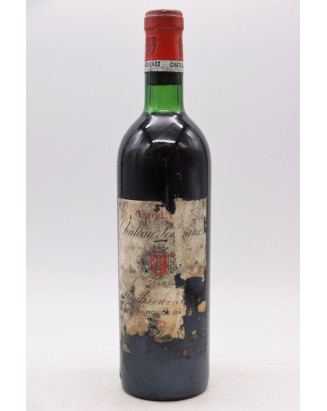






The origins of Château Poujeaux date back to the Middle Ages, when the Terre de Poujeaux was part of the Seigneurie de Latour Saint-Mambert, known today as Château Latour, a First Growth of Pauillac. The name "Château Poujeaux" first appeared in 1806, but it was not until the 19th century that the estate began producing its own wines and gradually gaining its independence.
Over the centuries, the estate has passed through several hands, undergoing divisions and regroupings. It was not until 1921 that the Theil family acquired the estate, reuniting the scattered parcels to form a coherent whole. This restructuring allowed Château Poujeaux to regain its reputation as a renowned wine estate.
The modern era of Château Poujeaux truly began in 2008, when the Cuvelier family, already owners of Clos Fourtet in Saint-Émilion, took the reins. Driven by Matthieu Cuvelier's vision and the know-how of oenologist Stéphane Derenoncourt, the estate embarked on a modernisation phase to reach the summit of the great Bordeaux wines. Thanks to meticulous management and significant investments, Château Poujeaux has reconnected with excellence and continues to establish itself as a benchmark for the Moulis-en-Médoc appellation.
The Château Poujeaux vineyard covers 68 contiguous hectares, nestled on the gravel ridges of the Grand Poujeaux, in the north-east of Moulis-en-Médoc. This terroir, composed of Günzian gravelly soils, gives the estate's wines a finesse and depth characteristic of the appellation. Located at an altitude of up to 25 metres, the vines benefit from ideal conditions for optimal ripening of the grapes, offering a perfect balance between power and elegance.
The vineyard's vine plantings are well-balanced, with a majority of cabernet sauvignon (50%) and merlot (40%), complemented by cabernet franc (5%) and petit verdot (5%). This diversity of grape varieties allows the estate to produce complex and expressive wines, with each variety contributing its own nuance. The vines, with an average age of 35 years, are planted at a density of 10,000 vines per hectare, ensuring optimal concentration of aromas.
Winemaking at Château Poujeaux is based on a philosophy of excellence and respect for the fruit. Each step is designed to enhance the intrinsic qualities of the grapes, from the selection of the plots to the final blends. The hand-harvested grapes are generally picked between mid-September and mid-October, with each plot harvested at its optimal maturity. A meticulous sorting ensures that only the best grapes are retained.
The modernised winery facilities, under the direction of the Cuvelier family, allow for parcel-by-parcel vinification thanks to small-capacity tanks. This enables the separation of the grapes according to vine age, grape varieties and plot of origin, to create complementary batches. The alcoholic and malolactic fermentations take place in vats for about a month, followed by a 12-month ageing period in French oak barrels, with 30 to 40% new oak depending on the vintage.
The art of blending, carried out with rigour and concentration, creates wines faithful to the spirit of Château Poujeaux, where elegance, depth and balance are the watchwords. Each vintage is a reflection of meticulous attention to detail and a constant quest for perfection.
Château Poujeaux offers several cuvées, each expressing the richness and diversity of its terroir.
Château Poujeaux
The estate's grand vin, Château Poujeaux, is a model of elegance and depth. Blended from the best lots, it offers a rich and complex aromatic palette, combining notes of fresh fruit, a beautiful tannic structure and a long, balanced finish. This wine, primarily made from cabernet sauvignon and merlot, embodies the very identity of the estate and offers excellent ageing potential. Approximately 250,000 bottles are produced each year, a testament to the estate's commitment to producing a wine of great quality.
La Salle de Château Poujeaux
The estate's second wine, La Salle de Château Poujeaux, is the result of a bold blend that combines freshness and fruit maturity. Its supple tannins and roundness make it an accessible wine, even in its youth, seducing with its fruity character and suppleness. It is a cuvée perfect for those who wish to discover the Poujeaux style with a wine ready to drink quickly. Each year, approximately 80,000 bottles are produced.
Haut de Poujeaux
Produced from 3.5 hectares located in the Haut-Médoc appellation, Haut de Poujeaux is a cuvée that expresses the authenticity of the regional terroir. With a limited production of around 20,000 bottles, this wine is sought-after for its unique character, elegant structure and authentic spirit. Haut de Poujeaux is a niche cuvée, reserved for knowledgeable enthusiasts in search of rare and distinctive wines.
The best-known Moulis wines are Châteaux Chasse Spleen, Gressier Grand Poujeaux, Maucaillou, Poujeaux...
Moulis-en-Médoc, one of the prestigious appellations of the Bordeaux vineyard, is renowned for producing remarkable wines, particularly during its finest vintages. Among the most notable are emblematic years such as 1975, 1982, 1985, 1986, 1989 and 1990, which have left their mark on fine wine enthusiasts. Other exceptional vintages include 1995, 1996, 2000, 2003, 2005, 2008, 2009, 2010, 2012, each recognised for its balance and depth. More recently, the years 2014, 2015, 2016, 2017, 2018, 2019 and 2020 continue this tradition, with particularly elegant and promising wines. These vintages offer an exceptional range of flavours and longevity, reinforcing Bordeaux's reputation as a global reference in wine-making.
A symbol of excellence and tradition, Château Poujeaux has established itself as an essential reference in the Moulis-en-Médoc appellation. Thanks to the commitment of the Cuvelier family and the know-how of its teams, the estate continues to seduce amateurs and connoisseurs with wines of great elegance and unique depth. Each vintage is the expression of an exceptional terroir and rigorous work, combining modernity and respect for Bordeaux viticultural traditions. Château Poujeaux offers refined wines, capable of ageing beautifully while remaining accessible and pleasant in their youth.